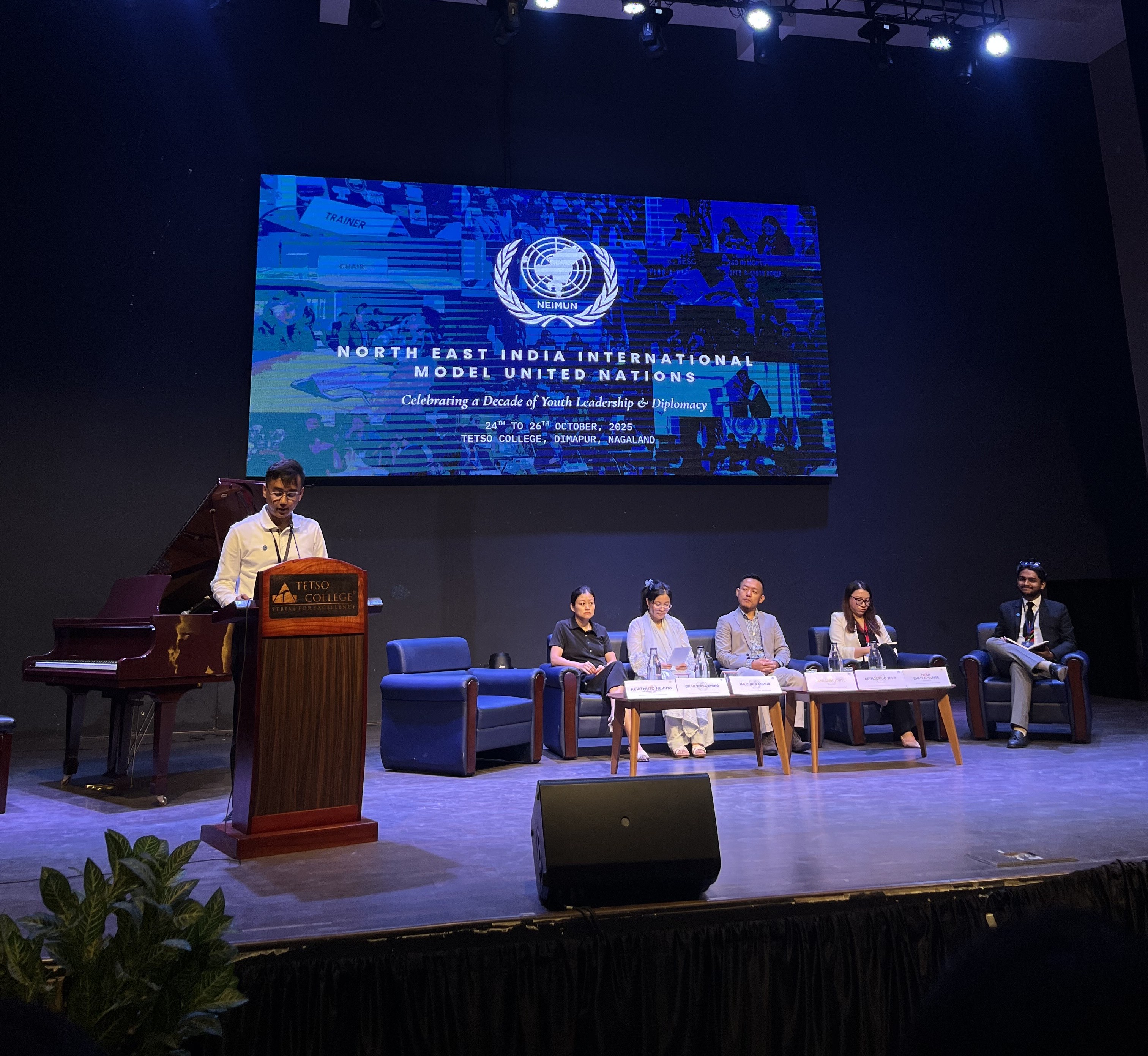MONDAY, OCTOBER 27, 2025
- Home
- 10th North East India International Model United Nations 2025 held at Tetso College
10th North East India International Model United Nations 2025 held at Tetso College
The 10th North East India International Model United Nations 2025 was held at Tetso College, Chümoukedima, empowering youth leadership.
Share

DIMAPUR — The 10th North East India International Model United Nations (NEIMUN) 2025 was held at Lorin Hall, Tetso College, Chümoukedima. It commenced on October 23.
The three-day conference, themed “Youth and economic security: building a resilient future from the ground up”, brought together delegates, educators, and experts to deliberate on global challenges and the role of youth in driving change, according to an update.
The opening ceremony began with a United Nations Day video and was presided over by Sarah Zhimomi, deputy under-secretary general for publicity and delegate outreach.
In his welcome address, Kevithuto Neikha, secretary-general of NEIMUN 2025, encouraged young people to take up space and make their voices heard. He expressed appreciation to Tetso College and the organising team, noting that NEIMUN had spent the last decade connecting youth and fostering global citizenship.
Also read: Amur falcons arrive at roosting site in Nikhekhu village
Kethosino Tepa, executive board member of the NEIMUN Foundation, spoke of her long association with the organisation, describing it as a space where transformation begins through experience and collaboration.
Principal of Tetso College, Dr. Hewasa Khing, commended NEIMUN for providing meaningful opportunities for young people to grow academically and personally and reaffirmed the college’s pride in hosting the milestone edition.
In a message, Benjamin Vinito, consultant for strategy and design under the Department of School Education, Nagaland, underlined the importance of diplomacy in developing innovative and inclusive solutions.
Delivering the keynote address, Imtijungla Lemtur, EAC, ADC Court, Dimapur, highlighted the vital role of youth in driving inclusive economic policies and aligning local actions with the Sustainable Development Goals (SDGs).
Representing the youth, Ayush Bhattacharjee, chief of international press, discussed the challenges facing journalism in the digital era and cautioned against echo chambers and algorithmic bias. He said young people must rise above curated narratives and shape informed, inclusive conversations.
Also, to promote sustainability, NEIMUN collaborated with ZubZub, a Nagaland-based facilities management company, for a live waste management demonstration led by CEO Pelenuo Yhome. The initiative aimed to encourage responsible environmental practices among participants.
Panel on digital rights and online safety
Meanwhile, the NEIMUN Youth Hall 2025 featured a panel discussion titled “Guarding the digital generation: law, rights and online safety”, moderated by Ayush Bhattacharjee.
The discussion included Rabindra Hazari, senior advocate at the Bombay High Court and Supreme Court of India, and Pangerkumzuk Longkumer, cybersecurity expert and founder of NexusCipherGuard India.
Hazari spoke about the Right to Privacy in India, referring to the Auto Shankar case to illustrate how censorship and state control often intersect. He noted that law and justice are often subject to interpretation and observed that defamation laws are sometimes used by governments to suppress dissent.
Longkumer addressed the issue of modern surveillance and described the paradox of cybersecurity in the context of spyware such as Pegasus. Responding to Bhattacharjee’s comment that cybersecurity, like national security, depends on who defines it, Longkumer observed that surveillance justified in the name of security often crosses ethical boundaries.
Hazari cautioned against the growing exploitation of personal data, calling data the new petroleum, and expressed concern that the Digital Personal Data Protection Act, 2023, might allow greater government access to citizen information. He questioned the handling of biometric data collected at airports.
Both speakers agreed that technology is evolving faster than legal frameworks and emphasised the need for dynamic policy structures and stronger digital literacy among youth to safeguard democracy in the digital age.

